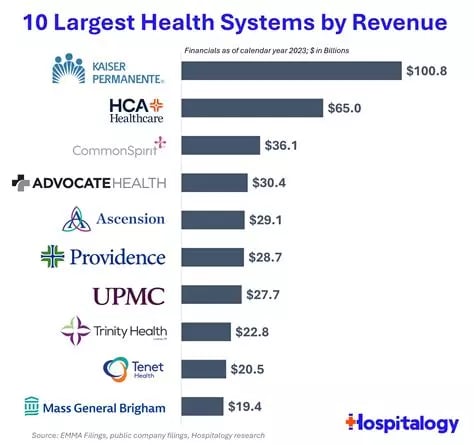Oligarchy Degrades Everything - Health Care Edition
Corporations deciding which diseases are “worth” curing, which lives are “worth” saving breeds despair. That, that quiet despair, is the deepest moral cost of oligarchy.

Depending on how you want to count them, welcome to the second or third edition of the newsletter in which we're tackling the harm wrought on society by billionaires and their consolidation of wealth. A long-time reader reminded me that this series is downstream of a prior series in the newsletter about monopolies. As they pointed out these Venn Diagrams, the harm caused by monopolies and harm caused by wealth consolidation by billionaires, definitely overlap. If you weren't subscribing then, you might want to give the series a read here, here, and here.
For folks uninterested in all that homework my core thesis in this series is not especially complicated:
Excessive wealth concentration is detrimental to the greater good in society and we've known this since at least the French Revolution
Moreover, this harm has been accelerated by the current crop of billionaires who have used their wealth to engage the mechanisms of elections and politics in ways that are a departure from historical norms
The emerging new paradigm is more akin to oligarchic post-Soviet states than western liberal democracy
Regarding point three, in her academic work author Sarah Kendzior really helped me understand the way oligarchy and authoritarianism took hold displacing the widely envisioned democratization at the end of the Soviet Union. I think this piece in particular on “Networked Authoritarianism in Azerbaijan" is required reading.
Now you're all caught up, and we can start this week looking at the moral cost of our current billionaire oligarchy.
II.
Every few generations, societies have to rediscover and confront that concentrated wealth is corrosive. This is not a new story but I didn’t live through the others.
The Enlightenment in its simplest sense was a rebellion against power (and wealth) concentrated in monarchies and the church.
What was chattel slavery if not a final boss level form of imposed economic inequality?
The Gilded Age, which we all need to read up on (no, not that one), was upended by the Progressive Era and labor movements.
Now in the era of tech oligarchs a similar fight looms. The longer the fight and reckoning is delayed the longer and deeper the rot gets to spread.
Saturday evening I watched a video of the President being asked about suspending Habeas Corpus and responding "suspending who?" seemingly not understanding what Habeas Corpus was. I couldn't decide at the moment if the video was AI or not and I was really, really annoyed that this is the future the richest people on Earth want.
I literally teach media literacy to high school students but found myself scouring for several minutes to see whether the video was genuine. I ended up finding the video re-posted by Wired and realized it was authentic. This specific, gnawing uncertainty—the inability to trust my own eyes and ears—is not a bug in our current system; it is its defining feature. We’re being moved slowly (and involuntarily by tech oligarchs) from the current era of misinformation, into an era of post-information, where the very concept of a shared, verifiable reality is dismantled.
III.
If you want to see what the moral harm of oligarchy looks like though, you don’t have to look at online misinformation or billionaire funded elections, you can look at health care.
In a health care system in which the organizing principle is profit, preventable suffering and misery are key economic inputs. The moral cost of oligarchy isn’t just that some people have mega yachts—it’s that others die because insulin costs ten times what it does in similarly wealthy states.
A for-profit health system doesn’t merely reflect inequality; it manufactures it. The uniquely American for-profit health care model generates billions in revenue for hospital chains (see below).

Following recent cuts to Medicaid in order to fund further tax cuts for the wealthiest Americans it is an inevitability that many rural hospitals will close or be consolidated into the networks above. Corporations deciding which diseases are “worth” curing, which lives are “worth” saving breeds despair. That, that quiet despair, is the deepest moral cost of oligarchy.
This is what moral exhaustion looks like in a society that has mistaken wealth for wisdom. And I think it’s that despair and sense of exhaustion that I find most alarming. People seem defeated facing impunity by those in power. You can pick your poison: local and federal law enforcement disregarding civil protections, an administration that weaponizes the law against their foes while habitually flaunting it themselves, or the oligarchs who dream of a Ready Player One-esque surveillance state filled with AI/VR/AR—a new digital frontier to be mined for profit.
The danger isn’t only that the powerful will keep consolidating control; it’s that the rest of us will stop believing anything better is possible. The question, then, isn’t how to tax or regulate billionaires, but how to recover our sense of shared agency in a world they’ve hollowed out.
—
Earlier in the newsletter I mentioned Sarah Kendzior’s writing about Azerbaijan. Kinda coincidentally, I was recently a guest on Sevinj Ozmaquizi’s YouTube Channel, talking about US media’s coverage of events in the Caucasus Region.
The last two newsletters have generated a ton of reader emails. I am going to let you all have your say next week with a reader mailbag, so if you have thoughts on the recent newsletters, blow up my inbox.